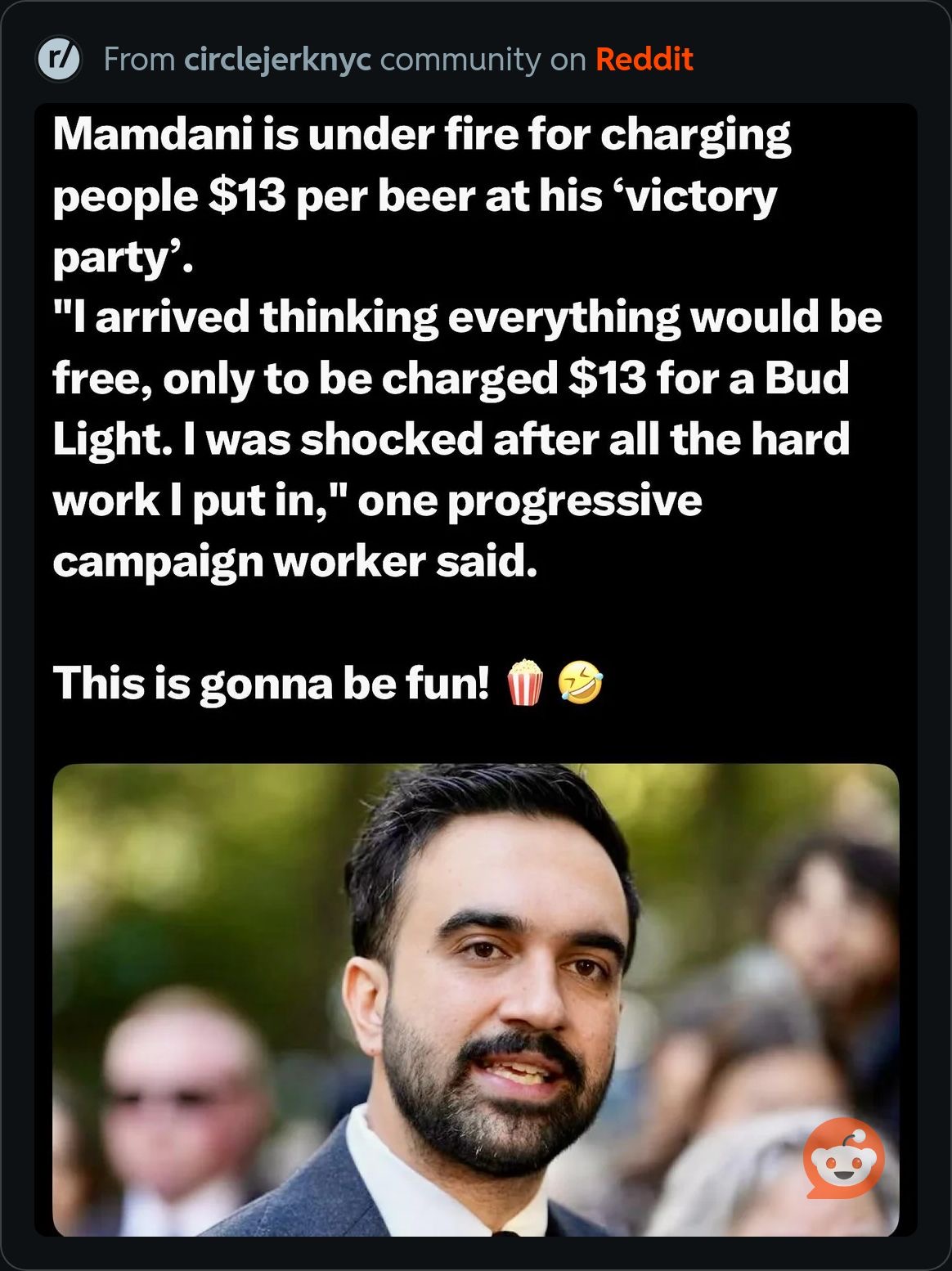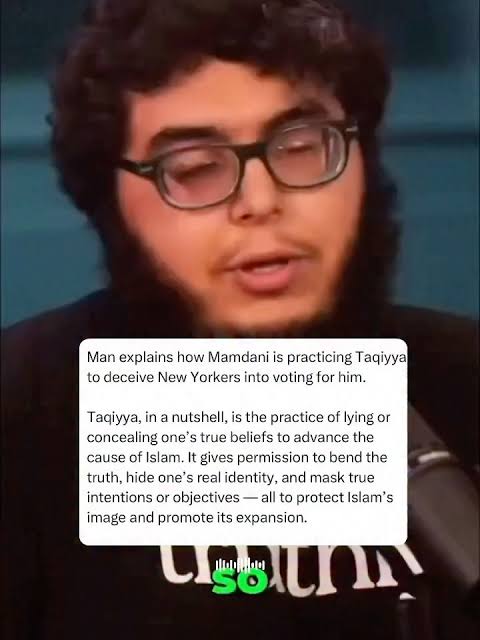New York just elected a mayor who promises to make the city cheaper by spending more, safer by policing less, and “Trump-proof” by suing gravity.
Zohran Mamdani’s campaign platform reads like a pitch deck written after a night of grad-school Marxism: rent freezes, 200,000 public housing units, city-owned grocery stores, “fare-free buses,” no-cost childcare, and a $30 minimum wage by 2030. All funded, naturally, by “taxing the 1%” and some light bond sorcery. It is sweeping, emotive, and—when you map it onto the actual authority of a NYC mayor—largely performative. Which is precisely the point.
It’s the kind of list that makes every utopian planner swoon—and every bondholder reach for a stress ball. But the audacity is the feature, not the bug. Mamdani’s governing philosophy isn’t about feasibility; it’s about belief. What he’s selling is moral absolution disguised as municipal policy.
And that, dear reader, is what makes it political taqiyya: the art of lying beautifully for power.
(Clarification for the permanently offended: “taqiyya” here refers to the tactical use of deception in pursuit of victory—an analogy, not a theological argument. Calm down.)
The Promise Factory
Start with the slogans: “Lower costs. Make life easier.”
Who wouldn’t buy that? The platform reads like a socialist vending machine—press a button, get a free thing. Freeze rents, make buses free, build housing, pay everyone $30 an hour, make groceries public property.
It’s political maximalism in PowerPoint form. Every item sounds decisive; none survive contact with the city charter.
The rent freeze? Controlled by the Rent Guidelines Board, not the mayor.
The fare-free buses? The MTA answers to Albany, not City Hall.
The $30 minimum wage? That’s state law, baby.
And the bond-backed housing binge? Sure, if you can find $70 billion lying around between the subway rats and the pension fund shortfalls.
The numbers on his site are technically impressive, like someone playing SimCity with God Mode on. It’s persuasion by checklist, not implementation plan. The site lists these promises explicitly, with the headliners presented as done-deals rather than multi-layered fights across multiple jurisdictions (Rent Guidelines Board, Albany, MTA, bond markets).
“200,000 new rent-stabilized homes in ten years” funded by $100 billion in capital spending, including $70 billion in new municipal bonds. But the mayor can’t issue that debt unilaterally, nor can he order the state to expand rent stabilization. The math works fine as long as you ignore the laws of math. There’s also a pledge to double capital for NYCHA, “fully fund and staff” HPD/DCP/NYCHA, and advocate in Albany to expand rent stabilization to all new production—again, items that require cooperation from entities a mayor does not control .
This is not a policy document. It’s a mood board. Every major plank depends on actors and approvals outside the mayor’s jurisdiction.
That’s not oversight; that’s design. It creates a perfect circle of plausible deniability: claim credit for promises, blame others for reality.
Independent coverage has already started separating vibes from veto points. Rent freezes run through the semi-independent Rent Guidelines Board; fare-free buses require MTA buy-in and state dollars; tax hikes on high earners and corporations need Albany; and big-ticket capital spending bumps into the city’s debt caps and revenue volatility. Even sympathetic roundups concede the gap between promise and pathway is real (and immediate) . On groceries, the “municipal supermarket” idea is attracting headlines—and cautionary comps from city-run stores that became money pits elsewhere .
When Rhetoric Replaces Reality
What Mamdani understands—brilliantly, cynically, or both—is that in the modern progressive ecosystem, ambition is deliverable.
The act of promising the impossible now counts as success.
Because in a city where the press corps is essentially a cheering section with journalism degrees, failure is never a verdict—it’s proof of persecution.
Did the rent freeze collapse in Albany? Reactionary sabotage.
Did the debt market balk? Capitalist oppression.
Did the grocery plan implode? Corporate greed.
The policy doesn’t have to work; it just has to make the right people angry. That’s how you build a grievance-based coalition.
The media has redefined political honesty downward. Once upon a time, lying to voters was scandalous. Now, it’s rebranded as aspiration. The coverage doesn’t ask “Can he do it?” It asks “Isn’t it inspiring that he tried?”
Welcome to the Participation Trophy School of Governance.
The Incentive for Over-Promising
In an era when a friendly media and activist ecosystem can launder ambition as inevitability, the rational political strategy is to promise the outcome and outsource the friction. If/when the machinery balks—statutory limits, independent boards, fiscal constraints—you don’t own the shortfall; your opponents do. This is the “political taqiyya” incentive loop: maximize front-end mobilization with maximalist pledges; convert implementation failures into grievance fuel.
The structure mirrors the religious impulse of revolutionary politics: faith in intention over results.
And the coalition dynamics reward it. There is an increasingly visible Left–Islamist issue alignment in Western politics that provides street energy, institutional cover, and moral framing—even when policy specifics don’t pencil out. A growing body of commentary and analysis sketches how this alliance coheres around anti-imperial narratives, identity politics, and a shared moral binary that defines “resistance” as virtue in itself. See E-International Relations on the “strange alliance,” and Eli Lake on how the Gaza war reignited it in U.S. cities and institutions . Earlier debates in mainstream policy circles flagged a related problem for Democrats: avoid grappling with illiberal strains in Islamist politics and you end up marginalizing genuine reformers while empowering the loudest ideologues—a dynamic noted years ago by New America and Foreign Policy contributors .
Layer that onto New York municipal governance and you get the current incentive: promise maximal outcomes to keep the mobilized coalition mobilized. If Albany, the MTA, debt caps, bond markets, or the Rent Guidelines Board say no, then the failure isn’t the math—it’s “sabotage.” The narrative writes itself.
The Red-Green Alliance
None of this exists in isolation. Mamdani is both a product and a beneficiary of the growing Left–Islamist ideological convergence—the political marriage of Marx and Mohammed.
You can trace it across the activist landscape: anti-capitalist, anti-Israel, anti-Western—but pro-housing, pro-transit, pro-free-everything. What unites them isn’t economics or theology, but a shared sense of grievance and moral purity.
The radical left brings the slogans; the Islamists bring the absolution. Together they form a self-reinforcing moral loop: permanent opposition as permanent virtue.
Analysts have been documenting for years how Western leftists and Islamists found common cause in anti-imperial rhetoric and victimhood identity. The DSA, whose fingerprints are all over Mamdani’s campaign, openly courts this fusion. Their own materials preach anti-police, anti-prison, and anti-capitalist gospel under the banner of “solidarity.”
The result? A coalition that’s immune to reality-testing. If the programs fail, it’s because you didn’t believe hard enough—or because “the system” resisted.
That’s the beauty of faith-based economics: you can’t audit belief.
The Left–Islamist Feedback Loop
The rhetoric fits a broader ideological trend: an increasingly visible Left–Islamist issue alignment in Western politics. It’s not theological—it’s strategic.
The radical left supplies the language of grievance, the Islamist movement supplies the moral framework of resistance, and together they construct a politics of eternal victimhood and unaccountable virtue.
Political scientists and policy researchers have tracked this convergence for years. Analyses at E-International Relations describe it as a “strange alliance” united by anti-Western sentiment and identity absolutism.
Earlier work at USIP warned that Western actors often amplify the most illiberal voices inside Islamist politics, marginalizing genuine reformers.
By 2020, mainstream outlets were finally catching on. Newsweek reported on the DNC’s “deepening embrace of radical Islamists,” calling it a dangerous blurring of ideology and opportunism.
The Free Press and New America have since echoed those warnings—describing how Democrats’ refusal to confront the illiberal undercurrent in their coalition creates space for theocratic rhetoric inside secular activism.
The DSA’s own platform, documented by Canary Mission, reveals the ideological bedrock now mainstreamed into local politics: anti-capitalist, anti-police, anti-Zionist, and anti-state, wrapped in the language of human rights.
It’s this infrastructure that makes over-promising rational. Every failure is an attack from “reactionaries.” Every fiscal constraint is “capitalist sabotage.”
The convergence politics underneath
You can’t miss the movement architecture behind the messaging. NYC-DSA’s footprint in Mamdani’s machine is overt and proud; their issue grid (anti-police, anti-prison, anti-capitalism, pro-axis “resistance”) supplies the energy for maximalist promises and the frame when they stall. Activist dossiers are partisan and should be read critically, but even detractors inadvertently catalog the same thing supporters boast: a deep DSA embed in the mayoral project and a willingness to translate global “solidarity” narratives into local policy fights .
That coalition overlap is why “political taqiyya” works in municipal form. The Left–Islamist convergence lends moral absolutism to local technocracy—housing bonds become anti-imperial praxis; a rent-board vote becomes resistance to “reactionary” economics. When the math loses, the mobilization still wins.
How the Scam Works
It’s elegant, really.
- Promise outcomes that sound divine.
- Blame opponents when they fail.
- Monetize outrage for the next cycle.
By elevating the intention over the execution, Mamdani transforms failure into proof of righteousness.
That’s political taqiyya in a nutshell: deception that serves the cause. The lie isn’t an error; it’s the engine.
It’s why every left-wing “miracle plan” eventually collapses under its own contradictions—but never its own guilt. The adherents don’t lose faith when the rent freeze fails or when the municipal grocery hemorrhages money; they double down. Because in this theology, the sin isn’t failure—it’s opposition.
The Accountability Test
You can tell if this was ever meant to be real by watching for receipts.
- Actual bond term sheets—not slogans.
- Actual legislative drafts—not press releases.
- Actual pilot programs with budgets and metrics— not ribbon-cuttings with slogans about “justice.”
If those things materialize, great. Let’s see the results. But if they don’t, then we’ll know the plan was never a plan. It was a sermon and sermons don’t fix cities; they just make the collapse feel holy.
If these don’t materialize, the public will get what the incentives actually favor: maximalist messaging, minimal deliverables, and maximal grievance when the system resists. That’s not governance; that’s narrative management.
Mamdani’s program isn’t governance—it’s narrative engineering.
When these initiatives inevitably stall, expect the follow-up script: “We tried, but the system fought back.”
That is political taqiyya distilled: deception not for malice, but for power acquisition. The falsehood is tactical, the failure preordained, and the accountability outsourced.
Conclusion
Mamdani’s campaign promises are less about governing than governing emotion. He doesn’t need to make the buses free or freeze the rents—he just needs voters to believe that if it weren’t for evil forces, he could have.
That’s what makes him the perfect candidate for the modern Left’s political theology: part savior, part victim, all narrative.
New York hasn’t elected a reformer. It’s elected a priest of grievance—a man fluent in the new sacred language of politics, where impossibility is proof of sincerity, and sincerity is the only credential that matters.
Sources
- Zohran for NYC – “Platform” (2025)
- Canary Mission – “DSA Campaign” (Accessed November 2025)
- E-International Relations – “Strange Alliance: The Convergence of the Radical Left and Radical Islam” (July 23, 2025)
- Newsweek – “DNC’s Deepening Embrace of Radical Islamists” (September 2020)
- United States Institute of Peace – “Political Islam: The Power of the Muslim Brotherhood” (June 2003)
- The Free Press – “The Ties That Bind Islamists and Progressives” (October 2023)
- Police1 – “What NYC Mayor-elect Zohran Mamdani’s public safety agenda could mean for NYPD” (November 2025)
- New America – “The Democrats’ Problem With Radical Islam” (March 2024)


